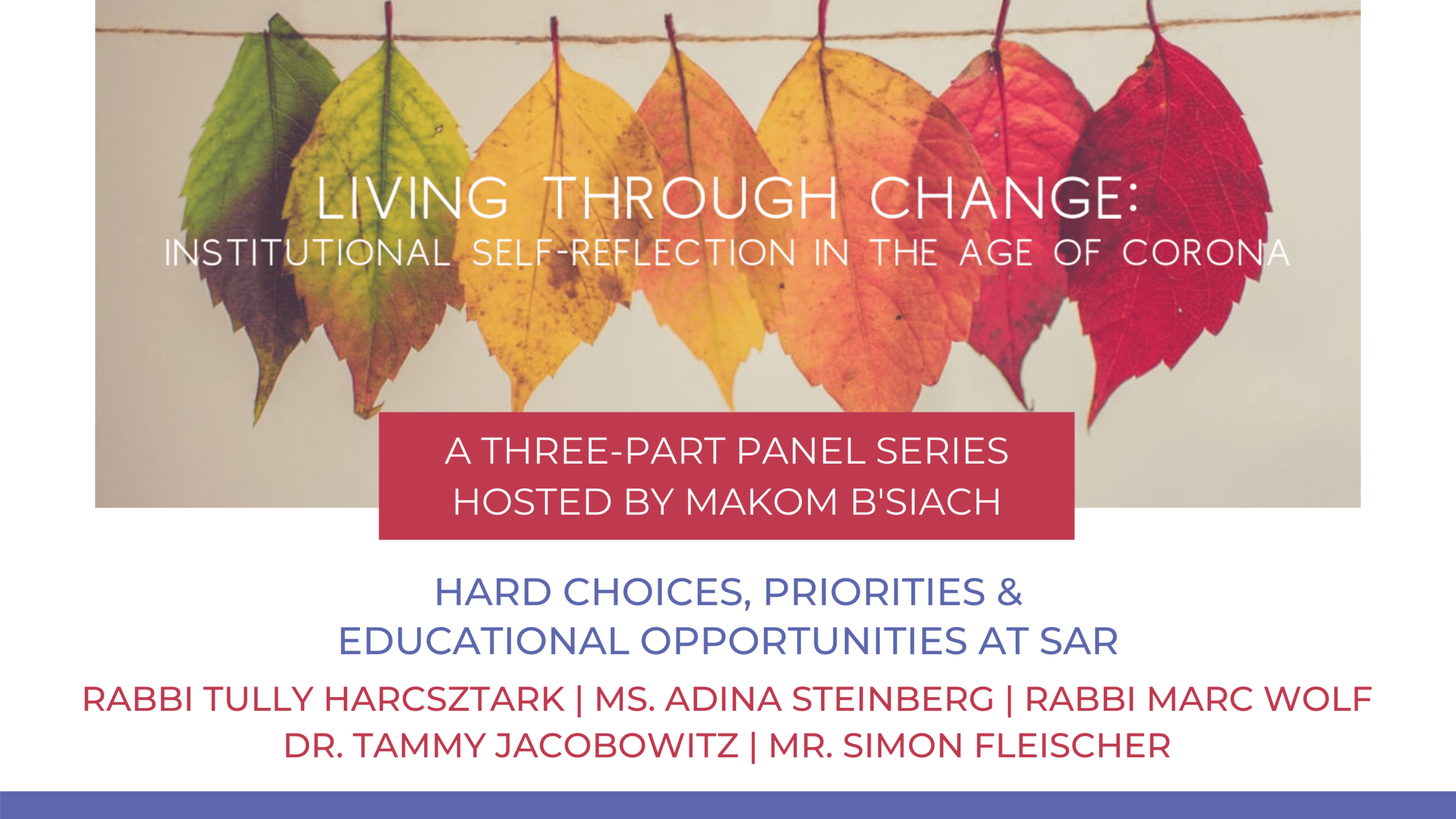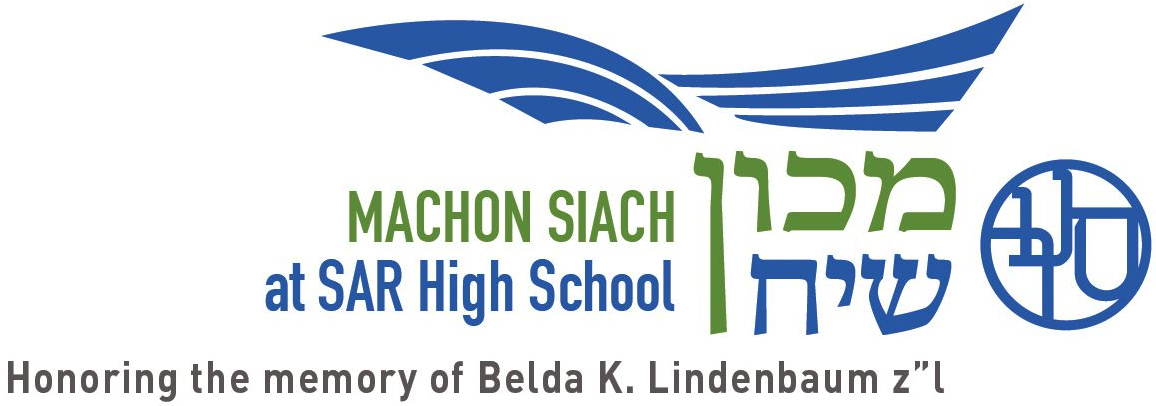Living through Change: Hard Choices, Priorities and Educational Opportunities at SAR
Photo: Rawpixel
Prepared Remarks for the Makom B’Siach Sponsored Program: “Living Through Change: Institutional Self-Reflection In the Age of Corona” Part I: Hard Choices, Priorities and Educational Opportunities at SAR (January 27, 2021).
As I reflect back on the experience of schooling during Covid, I distinguish two distinct periods of time. The first is when it actually began, those months in March, April, and May when we were most frightened, shocked, and scrambling. That was a time when we were struggling to keep our communal heads above water. Of course the physical health of our students and community was paramount; but educationally, four commitments drove our decisions:
- A commitment to the mental and psychological well being of our students.
- A commitment to re-establishing a sense of community and connection. Our students’ and our lives had become cut off in a swift, dramatic moment. We were alone, siloed. At that time, we intentionally chose to reduce class time and schoolwork. We dedicated class time to connecting with each other.
- A commitment to reestablishing a semblance of routine. Although we knew that virtual learning would not be the same, the routine could provide a sense of normalcy and stability in a time of crisis.
- A commitment to the learning and growth of our students, in both Torah and general studies, as best as we could muster.
Here’s how we did it: we shortened the length of the day and the length of the periods during the day. We cancelled all assessments and tests. We tried to find ways to connect with our students and parents through tisches, havdalah, town hall meetings and activities. Those first months were about getting by.
In June, July, and August we turned our attention to planning for a return to in-person learning. We were confronted with an entirely different set of circumstances, with a different set of questions which resulted in a different set of decisions. And yet, the same four elements kept coming up — mental well being, community and connection, having a daily routine and experiencing learning and growth. While we were not shortening classes and we would not need to take the same kind of class time to shmooze and connect, we did need to make sure that kids still had some time to socialize in school and more time to unwind after school. While we no longer needed to figure out Friday Zoom tisches and communal havdalah, we did need to figure out how kids could socialize meaningfully during lunch, have a socially distanced chagiga, and meaningful chavruta all while socially distanced. While we did not have any assessments last spring, we now needed to figure out a testing and assessment schedule that would be serious but not overly pressuring and taxing. How many hours can kids spend in school with masks? How many assessments are fair to have in a week? How will fellows work in this setting?
In fact, our priorities were consistent and clear through both of these periods of the pandemic. Throughout both of these challenging periods, we were focused on the same values. These were the levers, these were our commitments. Our job was to strike the right balance of all of these commitments under the specific circumstances with which we were presented.
We are now approaching the end of this tumultuous school year. What do I hope that we take with us? If we are truly committed to these four elements and I look at our schooling system from 30,000 feet, I experience the last thirteen or so months as highlighting some misalignments that were probably already present in our system and in need of attention before Covid hit. We seek to strike the right balance, a healthy balance of mental health, community and connection, stability and routine, and academic, spiritual and personal growth. We have always worked hard to develop a sense of community. High school kids certainly have routine — maybe too much routine. And we are engaged in lots of learning and growing.
Where are we falling short? I worry that the greatest misalignment is in the mental well being and shleimut (completeness) of our kids. We are trying to accomplish so many things and shoehorning them in wherever we can fit them — a packed dual curriculum that includes the arts and advisory and a rich co-curricular program while studying for standardized tests — and on and on. And everything is a tradeoff. When I look at the four values that drove our decisions and then think about returning to our previous schedules, I am concerned that we are short changing our goal for mental health and well being of our kids. There is too much stress; the days are too crowded; there are too many tests; the transcript is too high stakes. During much of the Covid period, school has been less stressful; the day is less crowded; there have been fewer tests. The transcript is still too high stakes – and that is an enormous problem.
So some things we should consider taking with us:
- Shorter days: Our kids’ lives are filled with too much stress and worry. I don’t believe we can keep the same early dismissal schedule that we have this year, but I do think that a shorter day would take the edge off. And I am torn. In many ways, kids would benefit from a shorter school day; at the same time, kids might learn less. I must add that the pressure of the college process looms large in all of this. If kids learned for full days and didn’t have to be in a panic about their transcripts, that would be much better on all fronts. We are part of that system, we are feeding those stressors and I am not sure how to get out of it.
- Fewer tests: Work to create less of a testing culture. This connects to the transcript comment. More assessments for the purpose of learning and feedback and fewer assessments for the purpose of judging and sorting and reporting to college. That would be a very large professional development undertaking.
- A measure of solitude: Use social distancing wisely to help create spaces of solitude. Social distancing is a good thing for tefilah; solitude and space are helpful for creating a more sacred space. But I never thought I would miss kids sitting next to each and talking to each other a bit during class. I miss that.
Perhaps most important of all and what ground all of the above: experiment, try new things and see if they work. Schools are hesitant to tinker. We develop habits; those are difficult to change. Perhaps the most profound thing we learned during this period is that we can manage change — extreme change — and adapt. We must strengthen our capacity to reflect, plan, experiment, evaluate.
The past year has been turbulent, trying and even traumatic for many. We have persevered and pushed through in so many ways – and for that, we should be proud. As we look to the future, we, in a life-affirming way, must learn all that we can from the experience and bring our most vibrant and creative spirit to the next stages of our return.



